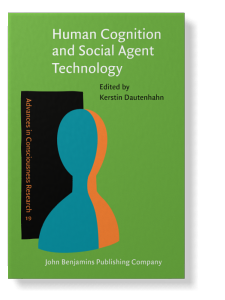Human Cognition and Social Agent Technology
Editor
Human Cognition and Social Agent Technology is written for readers who are curious about what human (social) cognition is, and whether and how advanced software programs or robots can become social agents. Topics addressed in 16 peer-reviewed chapters by researchers at the forefront of agent research include: Narrative intelligence and implementations of story-telling systems, socially situated avatars and ‘conscious’ software agents, cognitive architectures for socially intelligent agents, agents with emotions, design issues for interactive systems, artificial life agents, contributions to agent design from artistic practice, and a Cognitive Technology view on living with socially intelligent agents. The book addresses both software and robotic agents. On the one hand justice is done to the scientific and technical aspects, and on the other hand the reader will learn about pioneering technological developments which are necessary for a public discourse and critical evaluation on where social agent technology is leading us and how such a development can be shaped in order to meet the social, cultural and cognitive needs of humans.
The book is suitable for students, researchers, and everyone interested in this emerging and quickly growing field, it does not require any specialist background knowledge.
(Series B)
The book is suitable for students, researchers, and everyone interested in this emerging and quickly growing field, it does not require any specialist background knowledge.
(Series B)
[Advances in Consciousness Research, 19] 2000. xxiv, 448 pp.
Publishing status: Available
© John Benjamins Publishing Company
Table of Contents
-
About the Editor | p. ix
-
List of Contributors | p. xi
-
IntroductionKerstin Dautenhahn | p. xv
-
1. Narrative IntelligencePhoebe Sengers | p. 1
-
2. Digital Augmentation of Keepsake Objects: A Place for Interaction of Memory, Story, and SelfJennifer Williamson Glos | p. 27
-
3. Children as Designers of Interactive Storytellers “Let me tell you a story about myself…”Marina Umaschi Bers and Justine Cassell | p. 61
-
4. Autonomous Synthetic Computer Characters as Personal RepresentativesLinda Cook, Tim Bickmore, Sara Bly, Elizabeth Churchill, Scott Prevost and Joseph W. Sullivan | p. 85
-
5. “Conscious” and Conceptual Learning in a Socially Situated AgentMyles Bogner, Uma Ramamurthy and Stan Franklin | p. 113
-
6. Emotionally Grounded Social InteractionDolores Cañamero and Walter Van de Velde | p. 137
-
7. Architectural Requirements for Human-Like Agents Both Natural and Artificial: What sorts of machines can love?Aaron Sloman | p. 163
-
8. Connecting Reflection and Action: A Heterogeneous Multi-Agent ModelRuth Aylett and David Barnes | p. 197
-
9. The Role of Evaluation in Cognition and Social InteractionMaria Miceli and Cristiano Castelfranchi | p. 225
-
10. The Ontogeny of the Social Self. Towards a Formal Computational TheoryEric Werner | p. 263
-
11. Computational Embodiment: Agents as Constructed Complex SystemsChristopher Landauer and Kristie L. Bellman | p. 301
-
12. Are We Having Fun Yet? Using Social Agents in Social DomainsLeonard N. Foner | p. 323
-
13. The Emergence of Personality: How to Create Souls from CellsSteve Grand | p. 349
-
14. Machine-Mediated Communication: Agents of RepresentationBill Vorn | p. 377
-
15. Agents as Artworks and Agent Design as Artistic PracticeSimon Penny | p. 395
-
16. Living with Socially Intelligent Agents: A Cognitive Technology viewKerstin Dautenhahn and Chrystopher L. Nehaniv | p. 415
-
Subject Index
-
Name Index
“[...] this book is perhaps one of the most interesting I have read in the last five years. I would also like to mention that, while it is usually underestimated relative to the authors' contributions, the work done by the editor is really awesome. The biggest difficulty, in this case, is that the authors come from very different disciplines (AI, sociology, art and robotics) and yet there is a strong unity throughout the book. The organisation is clever and allows the reader (whether their background is in sociology or computer science) to progress quite easily.”
Alexis Drogoul, Université Paris 6, France, in Journal of Artificial Societies and Social Simulation (JASSS), July 2003
“[...] well worth reading for researchers in the area of user modelling and user-adaptive interaction.”
Annika Waern, Swedish Institute of Computer Science
Cited by
Cited by 7 other publications
Bosse, Tibor, Peter-Paul van Maanen & Jan Treur
Bosse, Tibor, Peter-Paul van Maanen & Jan Treur
Dautenhahn, K.
Dautenhahn, Kerstin, Alan Bond, Lola Cañamero & Bruce Edmonds
Landauer, Christopher & Kirstie L. Bellman
Schmidt, C.T.
This list is based on CrossRef data as of 12 april 2024. Please note that it may not be complete. Sources presented here have been supplied by the respective publishers. Any errors therein should be reported to them.
Subjects
Consciousness Research
Philosophy
Main BIC Subject
HP: Philosophy
Main BISAC Subject
PHI000000: PHILOSOPHY / General
